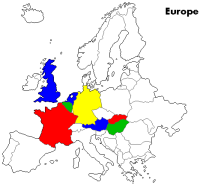Monthly Archives: May 2019
Wertheim Am Main, Germany
5/9/2019
Our Skirnir docked in Wertheim at 8:30am, and after an early breakfast we left on our Wertheim Walking Tour by taking the train about 9:15. Or a Mini-Train anyway.
And of course, as it’s been for the last few days, it was cold and rainy.
As we came down the gangplank there was a supply truck backed up starting to unload supplies, which strangely enough, seemed to be mostly made up of alcohol.
And for the first time I saw how the ship sometimes hooks up to shore power.
They would rather run their shipboard generators, but sometimes they have to use shore power for environmental reasons, and rather than try to wrestle with one really big, really heavy cable, they use 10 smaller ones.
The train dropped us off in front of the Spitzer Turm, also known as the Leaning Tower of Wertheim.
Tilting due to 800 years of Main River flooding, it was originally started in the 1100’s and added to in the early 1200’s. About 120 feet high, it once served as a prison for drunkards and “quarrelsome wenches”.
It really doesn’t tilt as much as the photo shows dur to lens distortion, but it is said to be a coupole of degrees further along than Pisa.
Like its slightly younger counterpart in Italy, there are regular attempts to stabilize it, with some success, I guess, since it’s still standing.
Wertheim is first mentioned as a city in 779A.D, and some of the many buildings supposedly have been around about that long, especially the ones known as half-timber houses.
And apparently the blue ones are a sign of wealth.
We made our way through the rest of the town taking in the many colorful houses and shops.
We also noticed a few of these ‘corner blocks’ that was the signature of the builder and his workers.
The date is kind of hard to make out, but it says 1595, kind of a youngster here, relatively speaking.
In the background of this city photo, you can make out the remains of Castle Wertheim at the top of the hill.
Dating from the early 800’s, the castle remains in ruins.
This colorful church has a strange history.
Originally it was a Catholic church, but with a change in local rulers, it was given over to the Protesants. Then another ruler, and it was back to the Catholics.
Rinse, Lather, Repeat.
Finally the citizens rebelled and divided the church between the two religions, and everyone was happy.
Getting back to the ship about 12:15, we saw the group getting ready for the 15 mile bike ride starting at 1pm.
Better them than Jan and I.
Heading out about 12:45 we got a better look at Castle Wertheim along the Main.
Further along we passed another castle on a hill, but bigger and more modern, it seems,
And more of the vertical vineyards, these bigger and more commercial it looks like.
About 5:00 we docked for a short time at Freudenberg to pick up the Bike tour riders, and then we were back on the way.
Later, a little before dinner, I looked out our room window and saw this.
This is the wall of the lock we were in, about 6 inches away. And it’s same on the other side, too.
At 443 feet long and 38 feet width, the Skirnir, and the other Viking river cruisers, are sized to fit in the smallest lock along the Danube/Main/Rhine rivers. And they cram in every inch they can.
Tomorrow:
Cruising the Scenic Middle Rhine ending up at Koblenz in the afternoon.
jkhklh
Würzburg
Würzburg, Germany 5/8/2019
Our ship docked at Würzburg at 7am after traveling all night from Bamberg, but we got to rest up since our Würzburg Residenz and Walking Tour didn’t start until 1pm. So we had plenty of time for a leisurely breakfast and a nice lunch with our friends before we headed for the buses.
Our first stop was, of course, the Würzburg Residenz.
Originally the Prince-Bishops of Würzburg resided in the Marienberg Fortress located on a hill overlooking the Main River and the city.
Note the vertically-planted vineyards. We saw vines planted like this all over Europe, but they’re apparenlty being phased out due to goivernment saftely regs. It seems that the workers slipping and rolling all the way to the bottom is a real problem. So now they’re moving to terracing.
But the Prince-Bishops thought that the Fortress was just too small to measure up to their exalted position. This is what they thought was too dinky for them.
So in 1720 construction was started on the Residenz, but like a lot of these projects, it dragged on through several different rulers, and it took 24 years to finish the exterior buildings, and then another 36 years to finish off the interiors in 1780..
But it was worth it as you can see from these exterior shots.
And what it looks like from the read, out over the gardens.
Unfortunately, like many of these places, the Residenz had a ‘no photos’ rule. Now, of course, I can understand a ‘no flash’ rule, but really, why no photos at all?
And as usual, somebody’s taking photos because they’re all over the Internet, so you get to see some of those. And the place is really something.
We spent a couple of hours touring the palace, and as happened in Nuremberg, when we came out, it had gotten much colder and was now sprinkling. None of which was forecast. Nothing new, of course.
We started the Walking part of the tour, heading into town, about a 15 minute walk, first checking out the Old Stone Bridge.
The first bridge here was built in 1120 A.D., but was destroyed in a flood in1342. It was rebuilt, and, until 1885, was the only to get to Wurzburg from across the river.
Of course, when it was built, it was a pedestrian bridge, and still is.
As we walked around we came across a number of these burled trees.
I don’t know what the story is on these, but there’s nothing on the Internet about them.But they were all over the place.
Our next stop was at St. Michael’s Church.
Like many churches over here, there have been a series of churches here, with the first one dating to 1221 A.D.
This incarnation dates from 1763, a veritable youngster in this area.
As this point, as evidenced from the raindrops on the photo above, and the fact that it was getting even colder, we decided to end our participation on the walking tour and headed back to the bus. And so did a lot of others.
One last fact is that in 1895, William Roentgen, working in his lab in Wurzburg, discovered X-Rays, and in 1901 was awarded the very first Nobel Prize in Physics for his discovery.
The same one that Sheldon won.
Later at about 7pm, warmer and drier, and with a nap under our belts, we met our friends for dinner.
We both started off with the Ginger Carrot Soup,
Really declivous, and reminded us of the fabled Pie-O-Neer in Pie Town, NM.
Jan had the Grilled Tilapia,
while I once again had my favorite Angus Ribeye. You just can’t have too much steak.
And for dessert, we both had the Apple Strudel.
You can’t go wrong with Apple Strudel in Germany.
Next Up: Wertheim Am Main (Wertheim on the Main River)
adfadsf








































